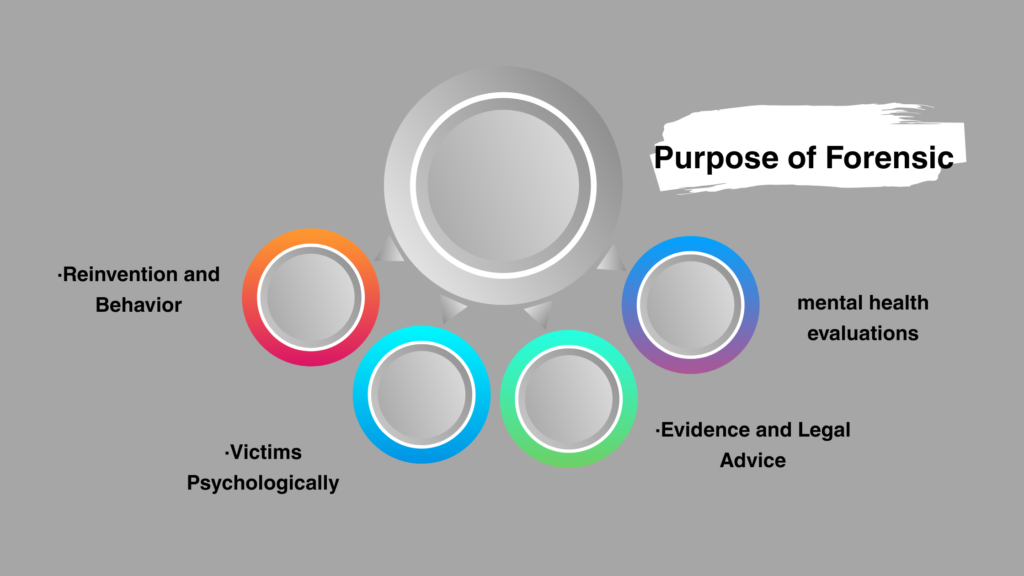
- Criminal Behavior Knowledge
- Court mental health evaluations
- Expert Evidence and Legal Advice
- Cooperating with police
- Supporting Victims Psychologically
- Reinvention and Behavior
- Juvenile Justice and Youth Offenders
- Family and Civil Law Applications
- Accepting Modern Legal Challenges
- Technology and data use
- Legal Reform and Policy Influence
Introduction
Forensic psychology is a subfield that focuses on applying psychological knowledge to the legal and criminal justice systems. It requires understanding how mental health, behavior, and cognitive processes interact with the law.
Forensic psychology plays a varied and vital function, from assessing a suspect’s mental condition to assisting crime victims. Its goal is to make legal systems more informed, ethical, and equitable by incorporating expert psychological insights into legal procedures and decision-making.
Criminal Behavior Knowledge
A key objective of forensic psychology is to understand why people commit crimes. Forensic psychologists investigate psychological issues such as personality problems, trauma, upbringing, societal effects, and mental diseases. These insights assist law enforcement and legal experts in understanding criminal activity’s motives.
This understanding facilitates successful profiling, inquiry, and legal decision-making. Rather than seeing a crime in isolation, forensic psychology examines the entire picture of the offender’s mental and emotional condition.
Court mental health evaluations
Forensic psychologists frequently perform psychological exams for people engaged in court cases. One of the most crucial tests is assessing a defendant’s competency to stand trial. This entails determining whether a defendant understands the allegations against them and can actively engage in their defense.
Psychologists also determine if the individual was legally insane at the time of the act. These expert evaluations give courts the factual information they need to make fair and proper legal decisions.
Expert Evidence and Legal Advice
Another essential objective of forensic psychology is to provide expert testimony in court. Forensic psychologists make complicated psychological ideas apparent and intelligible to judges, attorneys, and juries. Their testimony can potentially affect choices on sentence, criminal culpability, witness credibility, and trauma.
Their expert recommendations are supported by facts and experience, making them an invaluable resource for legal teams seeking precise and ethical results.
Cooperating with police
Forensic psychologists collaborate closely with police departments and detective organizations. They assist in developing offender profiles, provide insight into suspect behavior, and offer advice on interview procedures. Their grasp of human psychology may help cops manage difficult circumstances, such as dealing with crime victims or interviewing people with mental health issues.
Forensic psychologists also test police officers’ mental fitness, ensuring they are emotionally and mentally equipped for the demands of their jobs.
Supporting Victims Psychologically
Supporting victims is an essential component of forensic psychology. Crime victims frequently feel trauma, anxiety, and emotional discomfort. Forensic psychologists offer counseling and treatment to assist victims in recovery. They also help victims and witnesses prepare to testify in court, making them feel safer and more confident. This psychological support is critical in enabling victims to tell their stories and participate in the court system.
Reinvention and Behavior
In correctional settings, forensic psychologists contribute to developing rehabilitation programs aimed at modifying harmful behavior. Therapy may focus on anger control, substance misuse, emotional regulation, or social skills. The purpose is to lessen the possibility of recidivism and facilitate effective reintegration into society.
This technique demonstrates that with the proper therapy, many people can turn their lives around. Forensic psychology fosters a more productive and humane criminal justice system by emphasizing reform rather than punishment.
Juvenile Justice and Youth Offenders
Forensic psychology also substantially impacts juvenile justice. Young people who disobey the law are frequently still maturing psychologically and emotionally. Forensic psychologists analyze whether these persons are aware of the repercussions of their acts and what remedies might help them change.
These evaluations impact whether a young person is tried as a juvenile or an adult and the type of therapy or rehabilitation provided. This guarantees that the legal procedure is age-appropriate and mindful of developmental requirements.
Family and Civil Law Applications
Beyond criminal courts, forensic psychologists work in civil and family law disputes. In custody conflicts, they consider parenting ability, child welfare, and the family’s emotional climate. They may also assess persons engaged in personal injury, harassment, or workplace trauma litigation. Their professional evaluations offer a mental health viewpoint that assists courts in making educated, child-centered, and equitable judgments.
Accepting Modern Legal Challenges
Forensic psychology evolves in tandem with the environment around it. With the increase in cybercrime, digital addiction, and online harassment, forensic psychologists are increasingly working to better understand the psychological repercussions of contemporary technology.
They focus on cases of online stalking, internet fraud, and radicalization, providing psychological insight into today’s digital concerns. This keeps the field current and responsive to society’s evolving requirements.
Technology and data use
Forensic psychology is increasingly reliant on data and digital techniques to increase accuracy. Behavioral analytics, artificial intelligence, and psychological screening exams are becoming used in many evaluations. These advancements enable psychologists to spot warning signals sooner, evaluate behavior more effectively, and make better predictions about future behaviors. This tech-savvy strategy increases legal results while also improving safety and justice.
Legal Reform and Policy Influence
Beyond specific cases, forensic psychologists help shape legal changes by researching and advising on best practices. Their results strengthen legislation, eliminate sentence disparities, and push for improved mental health care in jails and courts. Their impact goes beyond the courtroom to policymaking, resulting in a more balanced, fair, and humane judicial system.
Conclusion: The true purpose of forensic psychology
Forensic psychology connects human behavior with the legal system. It assists legal practitioners in understanding the underlying psychological dimensions of crime, trauma, and justice. From performing mental health evaluations, helping victims, directing rehabilitation, and advising on legal regulations, forensic psychologists play a critical role in making justice systems more educated, ethical, and successful.
The field’s relevance grows as new legal and societal difficulties arise, making forensic psychology an essential component of modern law and order.
